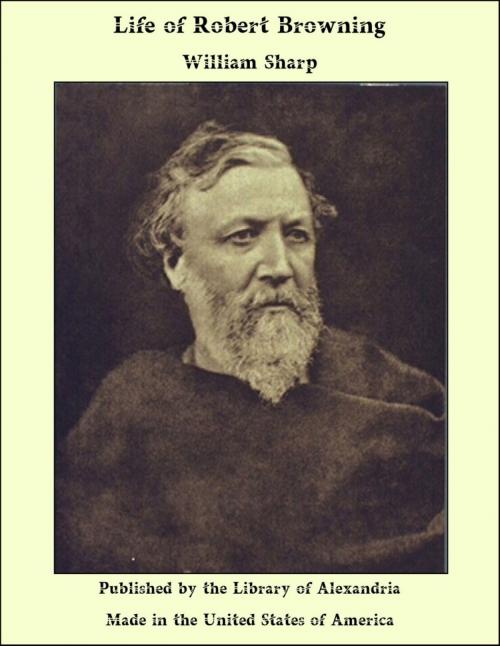| Author: | William Sharp | ISBN: | 9781465592378 |
| Publisher: | Library of Alexandria | Publication: | March 8, 2015 |
| Imprint: | Language: | English |
| Author: | William Sharp |
| ISBN: | 9781465592378 |
| Publisher: | Library of Alexandria |
| Publication: | March 8, 2015 |
| Imprint: | |
| Language: | English |
It must, to admirers of Browning's writings, appear singularly appropriate that so cosmopolitan a poet was born in London. It would seem as though something of that mighty complex life, so confusedly petty to the narrow vision, so grandiose and even majestic to the larger ken, had blent with his being from the first. What fitter birthplace for the poet whom a comrade has called the "Subtlest Assertor of the Soul in Song," the poet whose writings are indeed a mirror of the age? A man may be in all things a Londoner and yet be a provincial. The accident of birthplace does not necessarily involve parochialism of the soul. It is not the village which produces the Hampden, but the Hampden who immortalises the village. It is a favourite jest of Rusticus that his urban brother has the manner of Omniscience and the knowledge of a parish beadle. Nevertheless, though the strongest blood insurgent in the metropolitan heart is not that which is native to it, one might well be proud to have had one's atom-pulse atune from the first with the large rhythm of the national life at its turbulent, congested, but ever ebullient centre. Certainly Browning was not the man to be ashamed of his being a Londoner, much less to deny his natal place. He was proud of it: through good sense, no doubt, but possibly also through some instinctive apprehension of the fact that the great city was indeed the fit mother of such a son. "Ashamed of having been born in the greatest city of the world!" he exclaimed on one occasion; "what an extraordinary thing to say! It suggests a wavelet in a muddy shallow grimily contorting itself because it had its birth out in the great ocean." On the day of the poet's funeral in Westminster Abbey, one of the most eminent of his peers remarked to me that Browning came to us as one coming into his own. This is profoundly true. There was in good sooth a mansion prepared against his advent. Long ago, we should have surrendered as to a conqueror: now, however, we know that princes of the mind, though they must be valorous and potent as of yore, can enter upon no heritance save that which naturally awaits them, and has been made theirs by long and intricate processes.
It must, to admirers of Browning's writings, appear singularly appropriate that so cosmopolitan a poet was born in London. It would seem as though something of that mighty complex life, so confusedly petty to the narrow vision, so grandiose and even majestic to the larger ken, had blent with his being from the first. What fitter birthplace for the poet whom a comrade has called the "Subtlest Assertor of the Soul in Song," the poet whose writings are indeed a mirror of the age? A man may be in all things a Londoner and yet be a provincial. The accident of birthplace does not necessarily involve parochialism of the soul. It is not the village which produces the Hampden, but the Hampden who immortalises the village. It is a favourite jest of Rusticus that his urban brother has the manner of Omniscience and the knowledge of a parish beadle. Nevertheless, though the strongest blood insurgent in the metropolitan heart is not that which is native to it, one might well be proud to have had one's atom-pulse atune from the first with the large rhythm of the national life at its turbulent, congested, but ever ebullient centre. Certainly Browning was not the man to be ashamed of his being a Londoner, much less to deny his natal place. He was proud of it: through good sense, no doubt, but possibly also through some instinctive apprehension of the fact that the great city was indeed the fit mother of such a son. "Ashamed of having been born in the greatest city of the world!" he exclaimed on one occasion; "what an extraordinary thing to say! It suggests a wavelet in a muddy shallow grimily contorting itself because it had its birth out in the great ocean." On the day of the poet's funeral in Westminster Abbey, one of the most eminent of his peers remarked to me that Browning came to us as one coming into his own. This is profoundly true. There was in good sooth a mansion prepared against his advent. Long ago, we should have surrendered as to a conqueror: now, however, we know that princes of the mind, though they must be valorous and potent as of yore, can enter upon no heritance save that which naturally awaits them, and has been made theirs by long and intricate processes.















